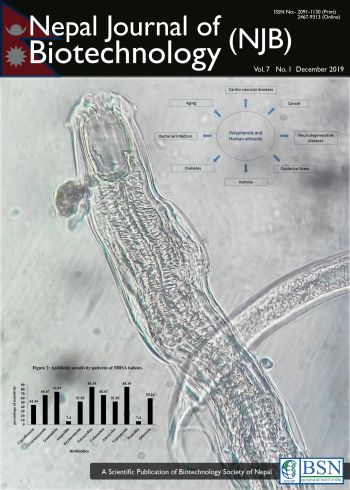Polyphenols: Nature's Gift as dietary phytoconstituents against different human ailments
DOI:
https://doi.org/10.3126/njb.v7i1.26955Keywords:
Polyphenols, Antioxidants, Bioavailabiliy, Cardiovascular disease, Diabetes, Aging, CancerAbstract
Recently, researches and scientists are showing a lot of interests in bioactive compounds of plants and its products as these constituents are of high valued. Polyphenols are phytochemical constituents which are the integral components in plants and their products that are associated with defensive mechanism against infections and various oxidative stress by free radicals. Green tea, fruits, vegetables, cereals and red wines are rich sources of polyphenolic constituents which attributes prevention from infections and diseases because of its antioxidant properties, anti-diabetic properties, and radical scavenging properties. Oxidative stress which is the primary reason for different ailments in humans is due to the free radicals that are present even during the normal health condition. Polyphenolic acids like cinnamic acid, romarinic acid, stilbenes like resveratrol, flavonoids like catechin, taxifolin, quercetin, and lignans like sesamin, pinoresinol, podophyllotoxin etc. are found to be effective against wide range of human diseases like oxidative stress, cardiovascular disorder, neurodegenerative diseases, aging, and cancer. These phytoconstituents prevent the diseases and provide relieving sensation via different mechanisms. Here, the study shows the importance of polyphenols with respect to the relevance of human health. As there are the promising applications of various bioactive constituents in a wide range of disease, further research should be encouraged on the mechanism of action and bioavailability of polyphenols.
Downloads
Downloads
Published
How to Cite
Issue
Section
License
Copyright Notice:
The manuscript submitted to NJB must be an original contribution, not previously published and should not be under consideration for publication elsewhere. When the manuscript is accepted for publication, the authors agree to automatically transfer the copyright of the article to the publisher. It should grant permission to any third party, in advance and in perpetuity, the right to use, reproduce or disseminate your article, according to the NJB copyright and license agreement.
Authors transfer copyright to the publisher as part of a journal publishing agreement but have the rights to: Share their article for Personal Use, Internal Institutional Use and Scholarly Sharing purposes, with the NJB applies the Creative Commons Attribution-NonCommercial CC BY-NC license to all the works we publish after Jun 2020 (Before it was CC BY-NC-ND). Under this license, authors agree to make articles legally available for reuse, without permission or fees, for virtually any non-commercial purpose. Anyone may remix, adapt, and build upon your work non-commercially, and although their new works must also acknowledge you and be non-commercial, they don’t have to license their derivative works on the same terms. More details on CC BY-NC refer to its Licence Deed and Legal Code.






